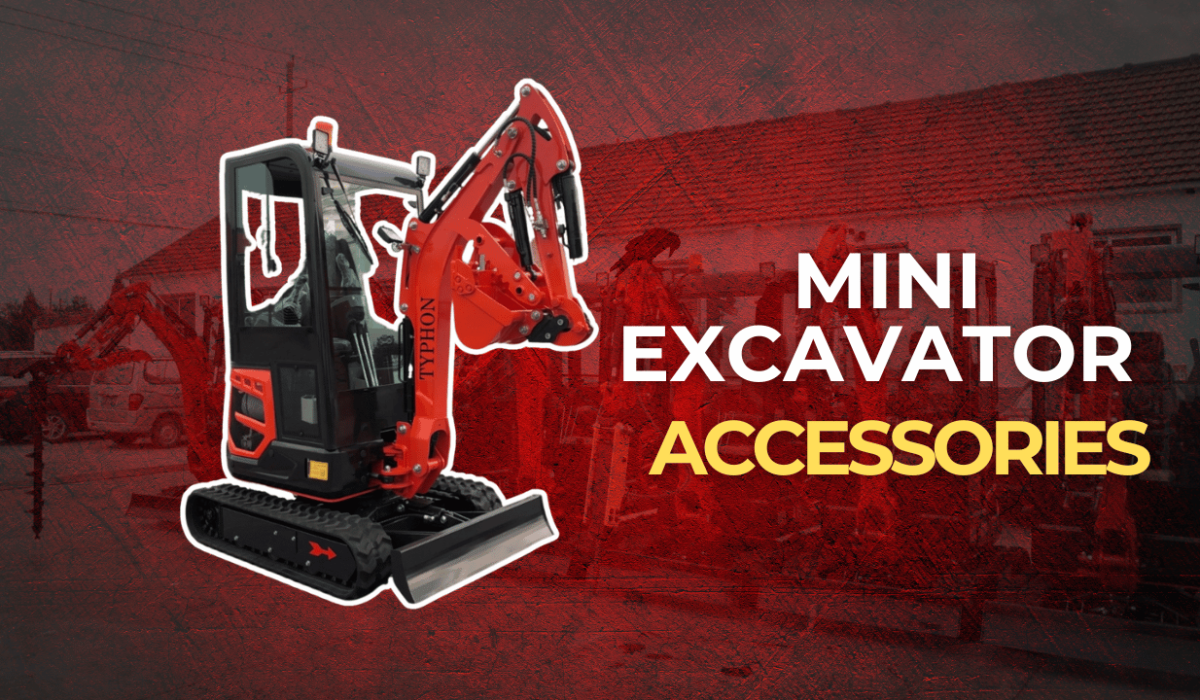The advantages of Industrial Mini Excavator Accessories and Engine Parts with American excavators
Performance of excavators affects both landscaping and construction efficiency. Excavators may tunnel and demolish. Still, expensive accessories and engine components might enhance performance. Understanding operational excellence helps professionals to choose products with superior quality.
Must-Have Tools for Improved Digging Performance
Select the correct attachments to increase excavator digging effectiveness. Key is widening bucket choices. Trenching buckets, grading, and specialized loading may all help performance. More precisely and quickly a widespan grading bucket levels surfaces than a digging bucket. To dig in various soil conditions, several manufacturers make buckets with adjustable teeth, therefore enhancing job effectiveness.
Non-standard excavation calls both advanced buckets and hydraulic attachments. To improve material handling, grab and work with things utilizing hydraulic thumbs on buckets. Augers speed ground drilling; hydraulic breakers cleave concrete or rock. On flexible projects, these excavator capacity upgrades boost output and save time.
Small excavators with ripper teeth work better on tough or hard-packed terrain. The attachments penetrate deep dirt buckets cannot reach and break up difficult materials. Ripper teeth distribute force and withstanding strong impacts, thereby controlling machine wear and providing stability. Addressing difficult site circumstances helps this addition increase excavator capacity and save project time.
Simple extras like revised buckets for specific activities, flexible hydraulic attachments for complete capabilities, and robust ripper teeth for hard sites may help construction workers boost the capacity and efficiency of an excavator. Purchase industrial mini excavator attachments to ensure equipment operates as expected and quickly changes to fit project requirements, therefore improving efficiency.b
Engine Components Enhanced Performance
Performance of an excavator depends on durable engine components. Excellent filters increase engine airflow. Move to high-efficiency air filters to save waste and dust and increase combustion. Prevention of pollutants helps to increase engine performance and maintenance examinations.
Excavators need improved fuel injectors. These parts improve fuel efficiency by precisely supplying gasoline in varying states. High-performance injectors let workers in demanding environments or during extensive trenching or foundation construction increase power output without fuel consumption. Lessening of pollutants lowers environmental impact and running costs.
Good oil filters are prerequisites for engine performance. Strong oil filters trap engine lubricant particles and pollutants to avert early component failure. Frequent oil filter replacements improve excavation performance and engine lifetime. Use manufacturer replacement guidelines to maintain filter performance all through machine operation.
Improvements in excavator reliability and efficiency come from air, fuel, and oil filters. Under many operational conditions, proper component selection lowers mechanical failure and maintenance downtime.
Attachments for Safety Gear
In excavating, safety absolutely rules. Crucially are gloves, helmets, and high-visibility vests. This helps pedestrians as well as construction site workers. Following safety guidelines helps to lower occupational fatalities and injuries. Safety-oriented industrial mini excavator attachments protect beyond PPE.
Working on excavations requires foresight. Strong equipment safety guards help to prevent mishaps in crowded or hazardous areas. More lighting options improve excavators’ view in darkness or fog. This helps operators to see their surroundings, therefore lowering safety concerns. Use energy-efficient LED lights to safely light larger worktops.
On uneven ground, excavation calls for stability. Supporting unstable excavators are stabilizers and outriggers. Stabilizers help the machine not fall during operation or material unloading by correctly spreading weight across its base. Outriggers balance the equipment and manage heavy lifting and deep excavation on tough terrain.
Safe tools and equipment in excavation help satisfy standards and increase output by avoiding mishaps and equipment downtime. Any general plan for industry operational performance and any tool optimization should take these safety enhancements into consideration.
Tools for Regular Maintenance
Maintaining excavators for best performance calls for the right tools. Machinery maintenance calls for engine analytics software and onboard diagnostic scanners. These real-time tools provide system diagnostics, hydraulic pressure, and engine temperature. Early problem spotting helps operators prevent minor issues from becoming costly or causing downtime.
Systems of lubrication help excavators run better. Moving components get automated application of grease or oil. This reduces wear hence extending link, bushing, and pin life. Changing flow rates allows one to modify lubrication to fit environmental circumstances or application.
Small excavator cleaning kits help to improve regular maintenance. Included to clean hard-to-reach machine components are specific brushes, solvents, and degreasers. Exterior cleaning improves look and helps to prevent rust and corrosion, which could interfere with functioning. Frequent hydraulic line cleaning helps to prevent accumulation that can lead to leaks or performance problems.
Tools for diagnosis, lubrication, and cleaning might let operators of excavators keep their machinery in good condition. Preventive measures reduce equipment costs and increase performance.
Automation with Technology Integration
Automaton and technology help to increase efficiency and accuracy of investigation. The GPS technology is remarkable. By crossing terrain, exact spatial data allows operators to maximize excavation patterns. In grading and trenching, GPS guarantees consistent cuts and fills, therefore minimizing material waste and improving work site efficiency.
Still another important excavator technology is telemetry. These devices track real-time running hours, engine temperature, and fuel consumption. The information lets operators evaluate and schedule equipment maintenance. By seeing problems before they call for significant repairs, telemetry-equipped industrial mini excavators help to lower engine wear and downtime.
Work site flexibility depends critically on smart attachments for industrial mini-excavators. These gadgets change their settings in real time for dirt or obstacles using robust robotics and sensors. By detecting ground hardness, a hydraulic hammer attachment maximizes impact energy without damaging surrounding buildings. Innovative technology increases performance and demonstrates how best to optimize output by selecting appropriate excavator attachments.
The capacity and operational outcomes of these technologies help building automation to progress. Innovation is crucial for maintaining competitiveness in a company as more excavation experts see the advantages of adding modern technologies to their fleet.
Justifiable Modifications
Budget increases could increase excavator performance without reducing ROI. Affordable attachment flexibility add-ons such as rapid couplers and varying bucket sizes let employees complete many operations without buying new tools. Two such are a superior grading bucket for soil leveling or a high-dump bucket for handling landscaping supplies. In different companies, changes increase output and help to save money.
Professional installations or do-it-yourself modifications rely on expertise and update complexity. For experienced maintenance staff, hydraulic line adjustments and tool repairs might be simple. Complicated telematics systems need knowledge. While hiring qualified personnel is more expensive, it increases equipment lifetime performance and integrity.
Outweigh temporary costs with well-chosen quality accessories. To boost engine performance and reduce wear and tear, replace air and oil filters. Calculated costs help to avoid machine downtime and maintenance.
Easy adjustments in excavator potential-maximizing cost nothing. By concentrating on low-cost repairs and understanding when to use DIY skills instead of professional ones, construction experts may make wise long-term decisions.
Choose the Right Accessories
Choosing the right excavator attachments increases performance and utility. Think through job kind, soil conditions, and equipment model before deciding on an attachment or accessory. In difficult terrain, heavy-duty digging buckets might help to lower tiredness. Evaluating job requirements helps to prevent equipment either over- or under-specification.
Key is must be compatible with your excavator model. Install certain manufacturer or series accessories incorrectly, and you risk damage or performance issues. Different hydraulic thumb attachments are used by manufacturers of industrial mini excavators. Before buying, operators should review industrial system compatibility product specs and installation guidelines.
Evaluating operational needs by task type helps to choose accessories. For precision and versatility, landscapers could call for grading rakes or trenching buckets. Building projects may benefit from better operator comfort and stronger attachments for deeper foundations or heavy lifting. Early discovery enhances on-site production and safety as well as simplifying processes.
Choosing accessories for compatibility and task requirements so requires careful consideration. Particularly for engines with high-efficiency air filters or oil filters, operators may avoid downtime by matching tools to their intended usage and understanding how they interact with present equipment to increase equipment performance and lifetime.
In essence, Enhanced American Excavator Operation
By optimizing capacity, industrial mini excavator accessories and engine components raise production and efficiency. Emphasizing the need of air filters, fuel injectors, buckets, and hydraulic attachments for digging efficiency, this conversation focused Maintaining functional integrity calls both regular maintenance and safety gear.
Getting these necessary tools and parts might decide the success of the job. To get best performance, operators should assess their needs and accessory compatibility. Correct equipment may increase production, reduce downtime, and help builders, landscapers, and do-it-yourselfers produce better results.





